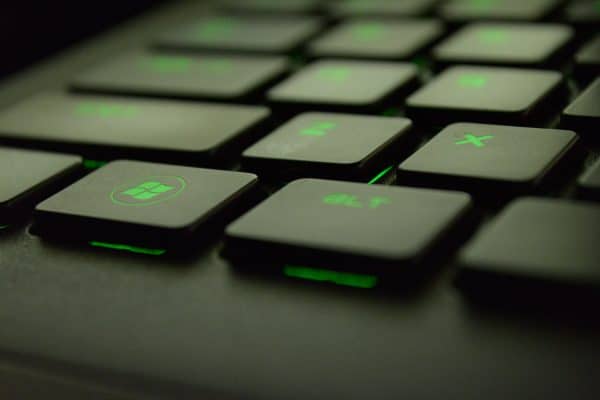Windows 10 is more intrusive than any other Windows version before it and the Ransomware malware manages to infect millions of consumers and businesses. All within a relatively short amount of time.
Seems like we need to be more careful with protecting our privacy and securing our computer. Just follow these simple Windows 10 hacks and you’ll be good to go.
Summary
All in all, these are the tips and hacks that we’ll be looking at:
- Install the latest updates
- Use a VPN
- Be Smart
- Set up a security configuration
- Configure your Windows 10 privacy settings
- Create a local Windows account without administrator permissions

Install the Latest Updates
Both Windows and 3rd party software updates are critical for your optimal experience and security.
3rd party software updates are often harder to handle because sometimes, they don’t get installed automatically. So, if you find it hard to manage all of them, consider using the best driver updater.
The importance of updates is greatly ignored by many. Especially when it comes to security updates.
Take the WannaCry Ransomware as an example. It managed to infect thousands of people on its own thanks to a zero-day exploit that is utilized.
The security patch was officially released for Windows 10 at least a couple of weeks prior. But people would delay the installation of it for as much as they could.
This is what ultimately caused so many people to get infected seemingly out of nowhere. If you don’t want to be the next victim of a zero-day attack, keep your computer updated.
For the most part, all you have to do is set your active hours correctly.
Use a VPN
VPN stands for Virtual Private Network. It’s a program that encrypts all incoming and outcoming network traffic so that nobody will be able to spy on your network activities.
A VPN can also hide your IP address and make it look as if you’re a completely different person, browsing from a different country. All in all, it’s a great tool to enhance your privacy by a lot without having to pay a fortune for it.
As for which one to choose, this mostly comes down to personal preference. I would generally advise aiming for reputable options like Express VPN.
Using a VPN basically means that you switch from trusting your ISP provider with your personal information over to your VPN provider.
The encryption that a VPN provides is so effective that not even the government will be able to spy on your network activities.
However, do keep in mind that this doesn’t apply to illegal activities. If you give the government a reason to track you down, they will. And your VPN provider won’t help you against that.
Set Up a Security Configuration
Malicious programs can be a huge threat both to your privacy and overall computer maintenance and security. Relying on a security configuration is the easiest and most efficient way of protecting yourself.
The most effective configuration is having one Antivirus and one Anti-Malware program at the same time. Yes, using two security programs at once is generally not recommended. However, that only applies when using two security programs of the same kind. Like, two Antivirus programs.
Using only one Antivirus and one Anti-Malware is fine as the two of them focus on different kinds of threats.
That is also precisely why that combination is so effective. When two programs focus on different threats, one is more likely to detect what the other misses.
As for which ones to choose, again, this mostly comes down to personal preference and needs.
And the process of choosing an Antivirus is much more complicated than that of a VPN. That’s because there are multiple pricing options with different features.
So, make your research and pick the ones that work the best for you. The combination of MalwareFox Anti-Malware and Windows Defender is a great starter/budget pack.
Be Smart
As mentioned above, using a security configuration is a great way to stay safe. However, security software is mostly restricted to detecting malicious programs.
So, let’s suppose that it’s an actual person who wants to harm your privacy and not a malicious program. Like a scammer, a black hat hacker, or something like that.
Chances are that your security configuration won’t be able to do anything. Cause there’s no malicious code to be detected. And as if that wasn’t enough, no security program is able to detect 100% of malware.
Which ultimately means that you can’t afford to completely rely on your security software. You need to use your head too.
Try to stay away from suspicious-looking websites, links, ads, emails, etc. Think, before you act. And if something looks too good to be true, then it most likely is.
Configure your Windows 10 Privacy Settings
Back in the day where Windows 10 first got released, people would always complain about how intrusive it was and how it was violating our privacy.
After a couple of updates, Microsoft gave us the option of tweaking our privacy settings to solve this problem. And we should take advantage of that.
You can easily configure your Windows 10 privacy settings by going to your settings and clicking on “Privacy”.
And there are plenty of options. You can prevent both 3rd party apps and MS from tracking your location, accessing your camera, your mic, and more.
Check it out for your own and tweak the settings until you feel comfortable with the amount of personal data that you provide.
Create a Local Account Without Administrator Permissions
This is another great security measure against malware, scammers, and hackers. See, most programs that want to mess with your computer, need administrator permissions to do it.
Without administrator permissions, there are very few things that you can change on a Windows computer.
Now, of course, the downside to that, is that you’ll have to insert your password every single time that you want to install a new program or anything similar.

















Great tips! With many technological advancements and gadgets popping here and there, those hackers we see in movies are getting more and more realistic. Simple things like using VPN to privately browse the internet is a great way of masking your information and not letting other people access it especially if you are using your private computer or own phone.